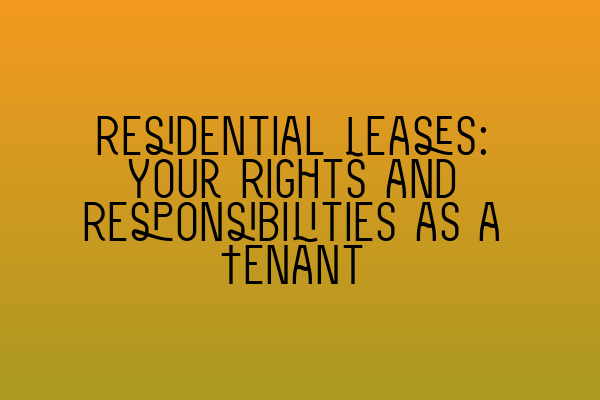Residential Leases: Your Rights and Responsibilities as a Tenant
Welcome to SQE Property Law & Land Law, where we provide expert legal advice and representation to tenants on residential leases. Renting a property can be an exciting experience, but it’s important to understand your rights and responsibilities as a tenant to protect yourself and ensure a smooth tenancy.
What is a Residential Lease?
A residential lease, also known as a rental agreement or tenancy agreement, is a legally binding contract between a landlord and a tenant. It outlines the terms and conditions of the tenancy, including the rental amount, duration of the lease, and the rights and obligations of both parties. It is essential to read and understand the lease agreement before signing to avoid any misunderstandings or disputes in the future.
Your Rights as a Tenant
As a tenant, you have certain rights that are protected by law. These rights include:
- The right to quiet enjoyment: You have the right to peace, privacy, and quiet enjoyment of the property. Your landlord cannot enter the property without proper notice, except in emergencies.
- The right to a safe and habitable property: Your landlord is responsible for ensuring that the property meets certain safety and habitability standards. This includes providing adequate heating, plumbing, and electrical systems, as well as maintaining the property in a reasonable state of repair.
- The right to fair treatment: Landlords cannot discriminate against tenants based on race, religion, gender, disability, or other protected characteristics. You have the right to be treated fairly and without prejudice.
- The right to a return of your security deposit: At the end of your tenancy, you have the right to receive a full refund of your security deposit, unless there are legitimate deductions for damages or unpaid rent.
It’s important to note that these rights may vary depending on the jurisdiction you’re in, so it’s always advisable to consult with a legal professional who can provide guidance specific to your situation.
Your Responsibilities as a Tenant
Along with your rights, you also have certain responsibilities as a tenant. These responsibilities include:
- Paying rent on time: You are obligated to pay the agreed-upon rent amount on time. Failure to do so may result in late fees or even eviction.
- Keeping the property clean and well-maintained: You are responsible for maintaining the cleanliness and good condition of the property. This includes regular cleaning, reporting any necessary repairs to the landlord, and not causing excessive damage.
- Abiding by the terms of the lease agreement: You must adhere to the terms and conditions outlined in the lease agreement. This includes not subletting the property without permission, respecting any pet policies, and following any other rules stated in the agreement.
- Respecting your neighbors: It’s important to be considerate of your neighbors and not engage in disruptive or illegal behavior that would disturb the peace and quiet of the community.
By fulfilling these responsibilities, you not only maintain a positive relationship with your landlord but also ensure a pleasant living environment for yourself and your neighbors.
Protecting Your Rights
If you believe your rights as a tenant have been violated or if you’re facing any issues with your landlord, it’s crucial to take the appropriate steps to protect yourself. Here are a few tips:
- Document everything: Keep a record of all communication with your landlord, including emails, letters, and phone calls. This will serve as evidence in case of a dispute.
- Report maintenance issues promptly: If you notice any repairs that need to be addressed, inform your landlord promptly in writing and keep a copy for your records.
- Seek legal advice: If you’re unsure about your rights or believe your landlord is acting unlawfully, consult with a solicitor who specializes in property law. They can provide you with expert advice and representation.
At SQE Property Law & Land Law, we are dedicated to protecting the rights and interests of tenants. We have extensive experience in dealing with residential leases and can provide you with the guidance you need to navigate the complex legal landscape.
If you’re looking for assistance in preparing for the SQE exams or other legal resources, we have a range of helpful articles and courses available:
- SQE 1 Practice Exam Questions
- SQE 1 Practice Mocks FLK1 FLK2
- SQE 2 Preparation Courses
- SQE 1 Preparation Courses
- SRA SQE Exam Dates
Feel free to browse through our website for more information or contact us directly for personalized assistance. We’re here to help!
